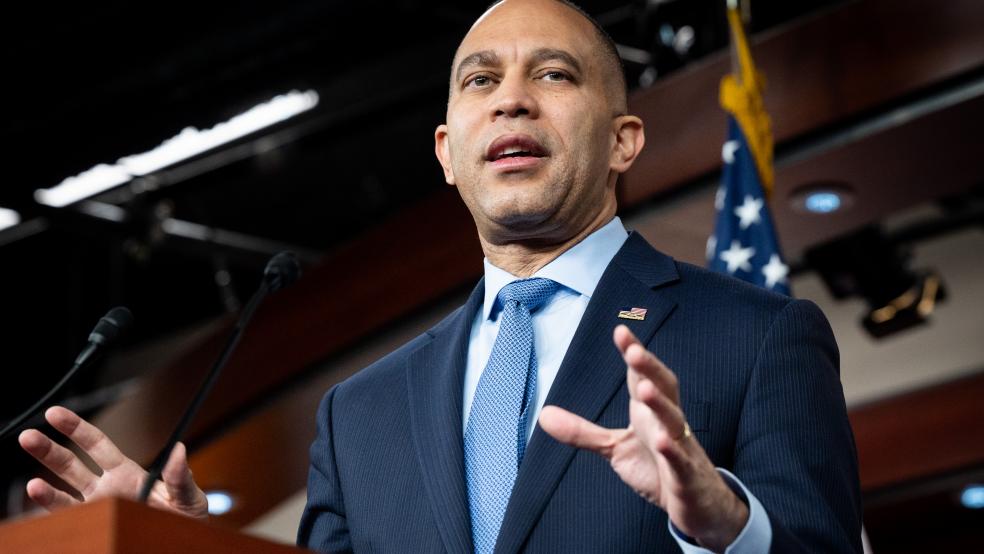House Democrats are maneuvering to prepare a fallback option that would force a floor vote on a bill to raise the debt limit — but the process would require the support of at least five Republican members, leaving the prospect of success highly questionable.
Minority Leader Hakeem Jeffries (D-NY) on Tuesday began to deploy what Carl Hulse of The New York Times called Democrats’ “secret weapon”: a bill meant to bypass House Speaker Kevin McCarthy (R-CA) and force a vote to increase the debt limit. Democrats had quietly prepared shell legislation that has been sitting around unnoticed and could be used to bring up what’s called a discharge petition addressing the debt limit.
“[T]he 45-page legislation, introduced without fanfare in January by a little-known Democrat, Representative Mark DeSaulnier of California, is part of a confidential, previously unreported, strategy Democrats have been plotting for months to quietly smooth the way for action by Congress to avert a devastating federal default if debt ceiling talks remain deadlocked,” Hulse writes.
Democrats would need a majority of members to sign on to their petition, meaning they would need at least a handful of Republicans to join in, and the complex process only allows them to start gathering signatures in a couple of weeks.
"House Democrats are working to make sure we have all options at our disposal to avoid a default,” Jeffries wrote in a letter to colleagues. “The filing of a debt ceiling measure to be brought up on the discharge calendar preserves an important option. It is now time for MAGA Republicans to act in a bipartisan manner to pay America’s bills without extreme conditions.”
The discharge petition would be a long shot, though.
“Several top Democratic lawmakers and aides have privately said that the discharge petition is not their preferred method of preventing a default, with many describing it as the absolute final option, to be used hours before a default would occur, if the White House and congressional leaders cannot strike a deal,” The Washington Post reports.
Senate Republicans have shown no interest in a clean debt ceiling increase or a short-term extension of the limit, either. “The only thing that can get 60 votes in the Senate is something between the president and the House Republican leadership,” Senate Minority Whip John Thune (R-SD) told reporters.
Majority Leader Chuck Schumer (D-NY) on Monday started the process to put two bills on the Senate calendar: the GOP plan passed by the House and a competing suspension of the debt limit through 2024. “Putting the bills on the calendar doesn’t guarantee a vote on either, but it does place Democrats’ ‘clean’ proposal without spending cuts head-to-head with the House Republican bill,” Politico reports. Neither bill would get 60 votes at this point.
“This process will ensure that once a clean debt ceiling is passed the House bill is available for a bipartisan agreement on spending and revenue as part of the regular budget process,” a Schumer spokesperson told reporters.
‘Big Four’ meeting set for next week: McCarthy and Senate Minority Leader Mitch McConnell (R-KY) have accepted President Joe Biden’s invitation to discuss the debt limit with him and Democratic congressional leaders at the White House on May 9.
One White House official told NBC News that the meeting is meant to emphasize “the urgency of preventing default” and spur talks about the 2024 budget, which Biden and Democrats say is the appropriate place for negotiations about the GOP demands for spending cuts.
The need for action is growing increasingly urgent after Treasury Secretary Janet Yellen told lawmakers yesterday that the deadline for raising the debt limit could be as early as June 1. Still, the path to avoiding a crisis remains entirely uncertain. The White House is holding fast to its insistence that the debt limit must be raised without conditions, and Republicans continue to insist that won’t happen. In the meantime, the two sides continue to lob their attacks.




